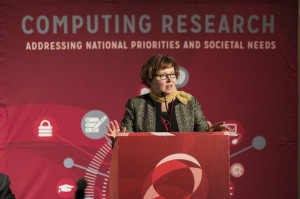 The following is a guest blog by Beth Mynatt, Computing Community Consortium (CCC) Chair, Professor and Director of Georgia Tech’s Institute for People and Technology.
The following is a guest blog by Beth Mynatt, Computing Community Consortium (CCC) Chair, Professor and Director of Georgia Tech’s Institute for People and Technology.
Computing technology creates the core capabilities in many industry sectors including healthcare. Healthcare in particular is beset with many challenges. Despite over $3 trillion (over 17% GDP) of expenditures, approximately ¼ of hospital patients suffer preventable harm. By some accounts, healthcare errors are the 3rd leading cause of death in the US following heart disease and cancer. Complexity abounds. Older adults typically can often be prescribed 10 or more medications and must coordinate treatment by as many clinicians. Correspondingly clinicians are treating more patients. ICU clinicians may juggle over 180 activities per day. At the end of the day, only ½ of recommended care is actually delivered. Simply raising healthcare delivery performance to match highest performers would result in 75,000 fewer deaths nationally. More generally, healthcare extends outside of institutional care settings. One driving question is how computing can enable aging adults to live longer at home, sustaining their health, independence and quality of life.
These challenges were discussed at the recent CCC two-day Symposium on Computing Research: Addressing National Priorities and Societal Needs. This meeting brought together over 130 in-person participants, 1000 online viewers and 25 attendees from federal agencies to discuss the current and potential role of computing in addressing societal needs including the pivotal role of computing in improving healthcare delivery.
Margaret L. Campbell, recently retired from her role as Senior Scientist for Planning and Policy Support at the National Institute on Disability, Independent Living and Rehabilitation Research (NIDILRR), presented key concepts behind Systems Engineering: Complexity and Personalization Are Key to Good Geriatric Care. Her presentation highlighted the recent PCAST report on Independence …. This report connects the well known statistics on the expanding population of aging adults, and associated healthcare costs, with specific strategies for computing research and policy to meet this growing need. Margaret also highlighted a less known fact, that traditional aging is often accompanied with physical and cognitive disabilities. Designing healthcare for an aging population requires designing for aging with disability. The challenge of providing healthcare for an aging population, with its increasing complexity of many medications, conditions and providers, requires a systems engineering approach centered on patient needs with interoperable systems that enable data analytics, coordinated decision support and opportunities for process improvement.
Charles (aka Chuck) Friedman, Josiah Macy, Jr. Professor of Medical Education at the University of Michigan Medical School, built on the theme of a systems engineering approach to healthcare delivery with the presentation The Learning Health Systems: Pointing to a ‘New Science.’ A Learning Health System, composed of both people, data, processes and technology, strives to continuously and routinely study and improve itself. Friedman outlines how Learning Health Systems (LHS) are evolving from an inspiring idea to an emerging reality as prominent healthcare systems such as Geisinger, Intermountain, Mayo and Kaiser, strive to incorporate learning at many levels of scale. These systems, and the ones that follow, will provide a foundation to new forms of medical science based on networking intelligence with rapid, incremental improvements. These systems are what is needed to reduce the tremendous gaps between best care and care that leads to 75 thousand unnecessary deaths annually.
Rory Cooper, FISA & Paralyzed Veterans of America (PVA) Chair and Distinguished Professor of the Department of Rehabilitation Science and Technology at the University of Pittsburgh, returned the discussion to Computing and Advance Technology to Improve the Lives of People with Disabilities and Older Adults. He showcased the role of computing technology empowering people with disabilities to stay active in their communities including health, school, employment and family activities. Akin to Campbell’s presentation, he reminded the audience that technologies for people with disabilities often have a wide reach such as technologies to promote healthy behavior and therapeutic exercise as well as IoT “smart home” technologies.
These discussions and related CCC workshops on Inclusive Access and Aging in Place remind our community that many fundamental advances in computing, from robotics to machine learning, human-computer interaction to ubiquitous computing, can play significant roles in addressing challenging barriers to improved healthcare for our nation and beyond.









